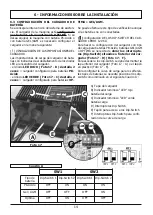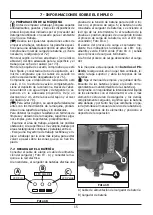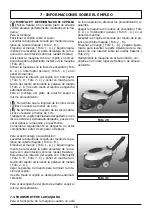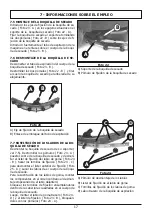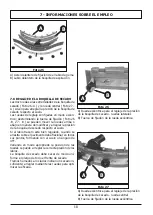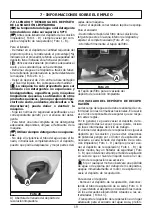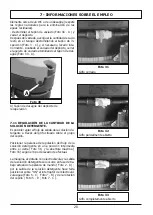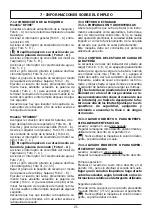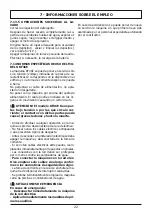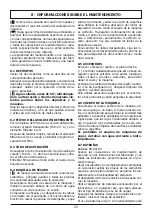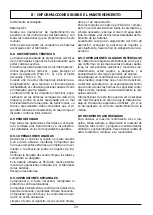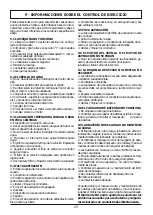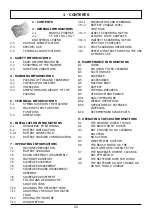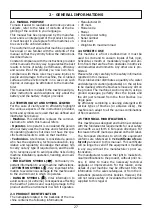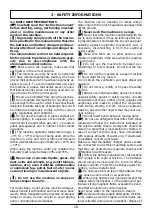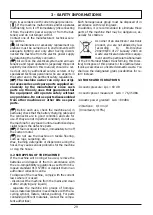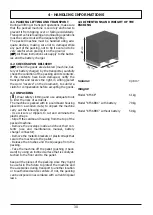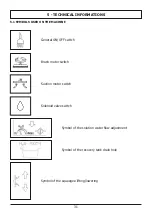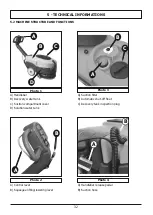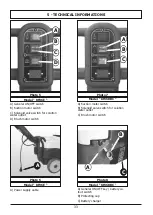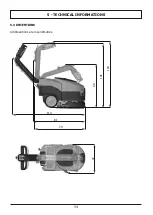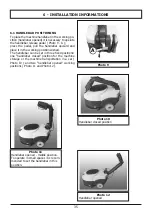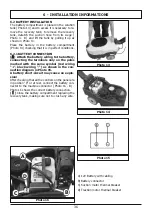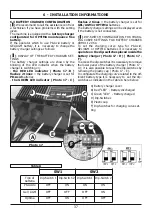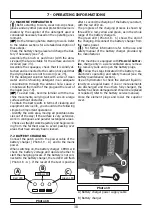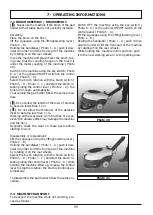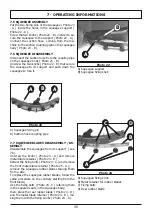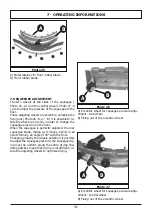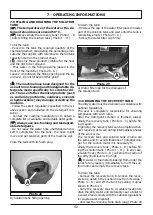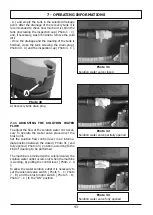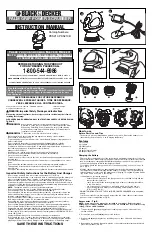
28
3 - SAFETY INFORMATIONS
3.1 BASIC RECOMMENDATIONS
(
☞
) Carefully read the “instruction manual”
before starting, using, performing unsched-
uled or routine maintenance or any other
work on the machine.
(
!
) Rigorously comply with all the instruc-
tions provided in this manual and in those for
the batteries and battery chargers (with par-
ticular attention to warnings and danger no-
tices).
The manufacturer will not be held responsi-
ble for injuries to persons or damage to prop-
erty due to non-compliance with the
aforementioned instructions.
(
☞
)
Before using the machine, make sure that
each part is in the correct position.
(
!
)
The machine can only be used by personnel
who have received appropriate training, who have
proven their skills and who have been expressly as-
signed to use it. To avoid unauthorized use, keep
the machine in a place that denies access to unau-
thorized personnel when not being used and re-
move the key from the control panel.
(
!
)
Minors are prohibited from using the machine.
(
!
)
Do not operate this machine for any other pur-
pose except for the use for which it was specifically
designed. Evaluate the type of building where it will
be utilized and rigorously comply with the current
safety regulations and conditions.
(
)
Do not use the machine in places without ad-
equate lighting, in explosive environments, when
harmful dirt is present (dust, gas, etc.), on roads or
public passageways and in outdoor environments
in general.
(
!
)
The machine operating temperature range is
+4°C to + 35°C; when not being used, store the
machine in a dry and non-corrosive environment
within a temperature range of b 10°C and
+ 50°C.
When using the machine under any condition the
humidity must range between 30% and 95%.
(
) Never use or vacuum liquids, gases, dry
dust, acids and solvents (e.g. paint thinners,
acetone, etc.), even if diluted, inflammables
or explosives (e.g. petrol, fuel oil, etc.); never
vacuum flaming or incandescent objects.
(
!
) Do not use the machine on slopes or
ramps steeper than 2%.
For small slopes, do not use the machine sideways,
always handle it with caution and never move back-
wards. When transporting the machine on steeper
ramps or slopes, be very careful to avoid tipping
and/or uncontrolled accelerations.
The machine can be handled on ramps and/or
steps only with the brush head and squeegee lifted
off the ground.
(
!
) Never park the machine on a slope.
(
☞
)
Never leave the machine unattended with the
key in and connected; it may be left only after hav-
ing disconnected it and taken the key out and guar-
anteeing against accidental movements and, if
necessary, disconnecting it from the electrical
power supply.
(
)
Make sure there are no other persons, and
children in particular, in the area where the machine
is being used.
(
!
)
Do not use the machine to transport per-
sons/things or to tow objects. Do not tow the ma-
chine.
(
☞
)
Do not use the machine as a support surface
for any weight for any reason.
Do not block the ventilation and heat dispersion
openings.
(
!
)
Do not remove, modify or by-pass the safety
devices.
(
!
)
Always use individual safety devices to ensure
operator safety: aprons or safety overalls, non-slip
and waterproof shoes, rubber gloves, goggles and
earphones, and masks to protect the respiratory
tract. Before starting to work, remove necklaces,
watches, ties and other objects that may cause se-
rious injuries.
(
!
)
Do not insert hands between moving parts.
(
☞
)
Do not use detergents that differ from those
required and follow the instructions indicated on
the relative safety sheets. Detergents should be
stored in a place that is inaccessible to children. In
case of contact with the eyes, rinse immediately
with copious amounts of water and, if swallowed,
immediately consult a physician.
Make sure that the battery charger power sockets
are connected to an efficient earthing system and
that they are protected by magneto thermal and
differential circuit breakers.
(
!
)
Follow the battery manufacturer’s instructions
and comply with legal provisions. The batteries
should always be clean and dry to avoid surface
leakage currents. Protect the batteries against im-
purities, such as metallic dust.
(
)
Do not place tools on top of the batteries: they
may cause a short-circuit or an explosion.
(
)
When using battery acid, rigorously respect the
relative safety instructions. In the presence of par-
ticularly strong magnetic fields, evaluate the possi-
ble effect on electronic control devices.
Never spray water on the machine to clean it.
(
☞
)
Recovered fluids contain detergents, disinfec-
tants, water, as well as organic and inorganic ma-
terial collected during work operations: dispose of

